- Details
-
Category: Chiefs of Naval Staff
-
Published: Thursday, 30 October 2008 00:00
-
Written by Webmaster 1
-
Hits: 13333
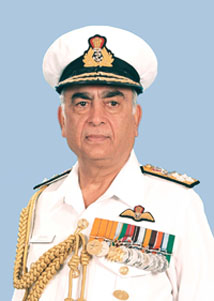
Admiral Sureesh Mehta, PVSM, AVSM, ADC
Chief of the Naval Staff & Chairman, Chiefs of Staff Committee
Admiral Sureesh Mehta assumed charge of the Indian Navy, as the 19th Chief of Naval Staff, on 31 October 2006. Born on 18 August 1947, he is the first service chief from the armed forces to be born post Indian Independence. He is an alumnus of the National Defence Academy (NDA) and was commissioned into the Executive Branch of the Indian Navy in July 1967. Shortly thereafter, he joined the Indian Naval Air Arm and extensively flew the Hawker Sea Hawk from the aircraft carrier Vikrant. He is a graduate of the prestigious Defence Services Staff College (DSSC) at Wellington and has also carried out instructional duties as a directing staff in that institute. He also attended the National Defence College (NDC) at New Delhi in 1994. His most distinguishing ship appointments include the command of INS Beas - a Leopard Class frigate and the first indigenously-built, guided-missile frigate of the Indian Navy - INS Godavari.
On promotion to Rear Admiral in 1995, Admiral Mehta was appointed as the Flag Officer Naval Aviation (FONA), where he was responsible for marshalling the resources of the entire aviation fleet of the Indian Navy. In October 1998, he was appointed as Flag Officer Commanding Western Fleet, a post he held with distinction till April 2000. It was during his tenure as FOC Western Fleet, that the incident of piracy aboard the MV Alondra Rainbow occurred in November 1999. This Japanese tanker was stopped by naval units under his command and the pirates were brought to book by his flagship, INS Delhi. He has also had the distinction of commanding INS Garuda, the Indian Navy's premier naval air station in Kochi, Kerala.
During Admiral Mehta's tenure as Assistant Controller of Warship Production & Acquisition and Assistant Controller Carrier Projects at Naval Headquarters, he initiated wide ranging initiatives to revitalize the naval fleet and was responsible for commencement of a host of important and critical ship & aircraft acquisition programs, in preparation for blue water operations of the Indian Navy in the 21st century. In his further appointments as the Assistant Chief of Personnel (Human Resources Development), Controller Personnel Services and Chief of Personnel at Naval HQ, he was responsible for the entire Personnel Management Policy of the Indian Navy.
Admiral Mehta was appointed as Director General (DG) Coast Guard on 13 January 2003 and he guided the force with the vision of establishing a strong, vibrant and visible Indian Coast Guard. He established linkages with India's maritime neighbours - both near and afar - and created common operating doctrines for tackling incidents at sea. He pursued a vigorous growth for the Coast Guard fleet and organisation, aided by active modernization programs. On the issue of piracy at sea, he has tailored Coast Guard operations towards adopting a pro-active approach in combating piracy in Indian and neighbouring waters.
Prior to taking charge as CNS, Admiral Mehta served as the Flag Officer Commanding-in-Chief (FOC-in-C) of the Eastern Naval Command from 30 September 2005. It was during his tenure at the ENC, that the first-ever Presidential naval fleet review was held on the country's east coast, which saw participation by over 66 warships and 50 aircraft of the Indian Navy. He also held the office of Deputy Chief of Naval Staff (DCNS) from 2004 to 2005. He was awarded the Ati Vishist Seva Medal (AVSM) in 1995 and the Param Vishist Seva Medal (PVSM) in 2005 for exceptional meritorious services. Admiral Mehta and Mrs Maria Teresa Mehta have two children. He was appointed as the Chairman Chiefs of Staff Committee (COSC) on 28 September 2007.
- Details
-
Category: Chiefs of Naval Staff
-
Published: Wednesday, 29 October 2008 00:00
-
Written by Webmaster 1
-
Hits: 11129
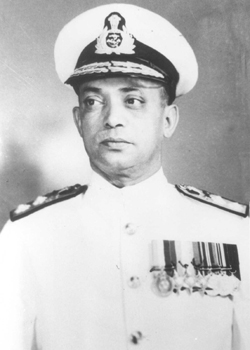 Vice Admiral R D Katari
Vice Admiral R D Katari
CNS, 22 Apr 1958 - 04 June 1962
Vice Admiral Ram Dass Katari assumed charge of the Indian Navy, as the 3rd Chief of Naval Staff, on 22 April 1958. The first Indian Chief of the Naval Staff and the first Indian to become an Admiral in Indian Navy, he has the proud distinction of holding many other 'firsts' in academic and professional careers. The senior-most Indian Officer of the Navy, Vice Admiral Katari was born in Chinglenut (near Madras) and spent his childhood and youth in Hyderabad. After completion of his school and college studies he joined the Training Ship Dufferin and stood first in the entrance examination.
Vice Admiral Katari has the unique triple distinction of being the first cadet to join the Training Ship Dufferin, when this institution was founded in 1927, to be first winner of the Viceroy's Gold Medal and to become the first Member representative Ex-Cadets on the Governing Body of the Dufferin. During World War II, he was active in service in the Atlantic and Indian Oceans and held a variety of appointments both afloat and ashore. Having specialized in anti-submarine warfare, he was for a while instructor in the Anti-Submarine School.
Read more: Vice Admiral Ram Dass Katari
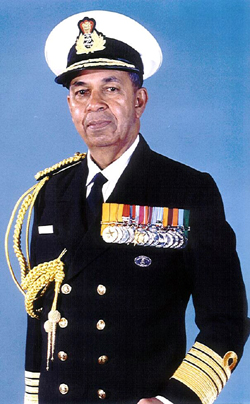 Admiral Madhvendra Singh
Admiral Madhvendra Singh


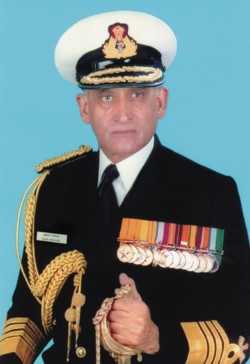 Admiral Arun Prakash
Admiral Arun Prakash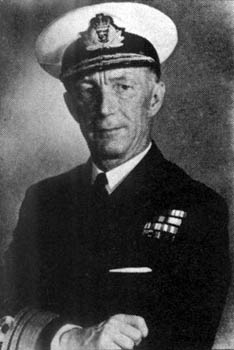 Vice Admiral Sir S H Carlill, BE, CB, DSO
Vice Admiral Sir S H Carlill, BE, CB, DSO

 Vice Admiral R D Katari
Vice Admiral R D Katari